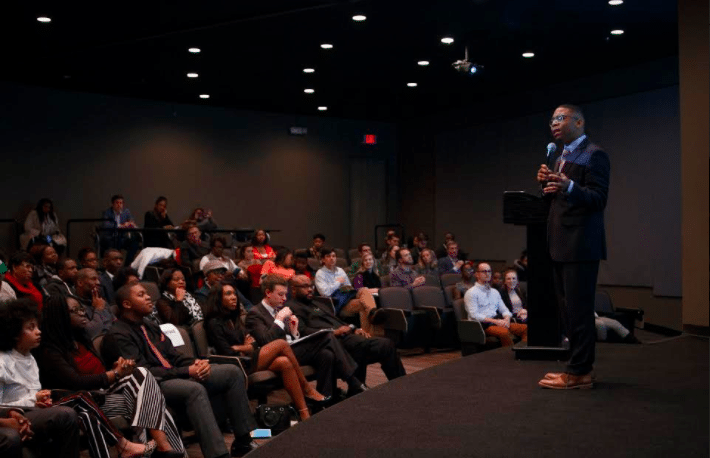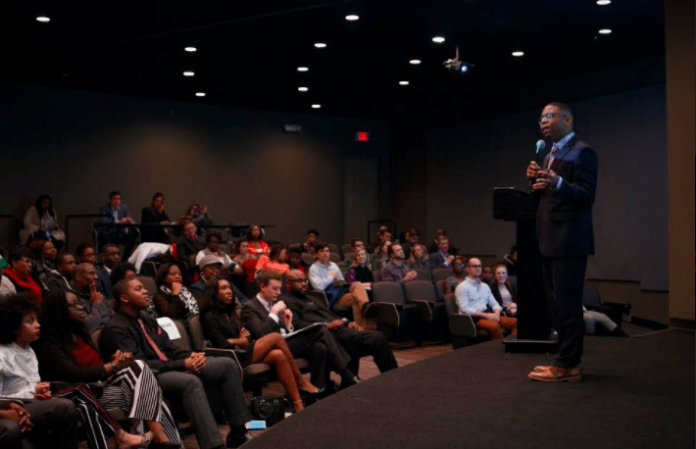In an attempt to close Memphis’ gaping disparities in wealth and education attainment, LITE Memphis trains high school students in entrepreneurial skills. That unique approach to community revival recently garnered the nonprofit a national award for civic innovation.
“Our mission is to equip African-American and Latinx students in the Memphis community with 21st-century skills to create wealth,” said Pamela Urquieta, executive director of LITE Memphis (Let’s Innovate Through Education).
In March, the Memphis-based nonprofit was named one of five winners of The Renewal Awards, organized by The Atlantic magazine. Sponsored by Allstate, the recognition also comes with a $20,000 prize.
A panel gathered by The Atlantic whittled down 3,000 entrants to 25 finalists. In the next phase, public vote accounted for 50 percent of the final score. A panel of outside judges accounted for the other half. The winners were announced on March 27 in a ceremony in New Orleans.
“We were encouraging all of our students, parents and community partners to vote for us to win,” said Urquieta.
“It was beautiful. The night before, everybody was talking about the struggles of how everybody’s nonprofits came about and the stories that they shared and also bouncing different strategies off of each other. It was a great moment,” said Urquieta.
Related: “Education through entrepreneurship”
During the event, the organizers questioned why entrepreneurship is the right path to follow when trying to bootstrap teens into successful adults, as these teens often come from communities with glaring inequities.
“It’s very common for people to donate time and money to education, transportation, health and crime rates,” said Urquieta.
Yet the underlying issue is often a lack of access to capital, which causes communities to stagnate and wither, she added. When banks turn their backs on a community, improvements can’t be made and business can’t start or grow. Property values and tax revenues decline along with future possibilities. But, if there’s money to be made and people who know how to make it, LITE Memphis believes the narrative could be changed.
“We believe that once these students learn how to scale business — we’re not just talking about a minor business — but something that is going to be innovative and have x amount of employees and generates x amount of revenue, that students will come back and money is going to rotate within their communities,” said Urquieta.
 Jalen Washington pitches at LITE Memphis pitch night in winter 2016. Jalen’s idea was Man Up, a mentorship program that matches young men who don’t have father figures in their lives with a mentor that can provide guidance and support. (Submitted)
Jalen Washington pitches at LITE Memphis pitch night in winter 2016. Jalen’s idea was Man Up, a mentorship program that matches young men who don’t have father figures in their lives with a mentor that can provide guidance and support. (Submitted)
Started in 2013 by Hardy Farrow, a former educator at Power Center Academy, LITE Memphis provides entrepreneurial skills to emerging juniors and seniors.
The program starts students out with a six-month apprenticeship where they advance in organization, problem-solving, goal setting and basic career skills. Students come from throughout the Shelby County school system and charter schools.
Related: “LITE Memphis connects budding entrepreneurs to network through internships”
“They kind of get their feet wet into what entrepreneurship really is,” said Urquieta.
After a foundation is laid, students have an opportunity to pitch their business ideas. Clayborn Temple will host the next pitch night on May 3.
“They get to show about 450 people what they launched in those six months and the skills they learned. Each week they learn a new skill,” said Urquieta.
After a pitch is accepted, the student is given $1,000 in prototyping money to grow their idea. As they emerge through the program, older students become education fellows. The graduates benefit from an internship program and collaboration with a team to build a small business.
The internship is completed through different community partners to provide real-world experience to build basic business skills. Some of the partners they work with are area nonprofits like Streets Ministries, Bridges, Memphis Athletic Ministries and Code Crew.
The program is still engaging students from that first class when the program launched in 2013. The oldest participant is 21, and the students will age out of LITE Memphis at 25.
“There was a really common theme between us and the other four winners and it’s that we all had a very long pipeline to work with the students. We’re with them for about 8 years because we realized you can’t bridge the wealth gap in six months,” said Urquieta.
Talia Owens joined the program her senior year at White Station High School. Her initial pitch was an initiative called Create the Stage, a theatre program aimed towards minority students from inner cities.
“Our major goal was to spread creativity and provide a positive outlet. After my time in the finalist program, I interned at LITE for 8 months until it was time for me to go to college,” said Owens.
Related: “Speed of LITE: Changing the visibility of minority entrepreneurs”
The Depaul-Chicago University freshman is currently working on a business launch with the help of LITE staff. She also serves as board chair of the nonprofit’s youth advisory council.
“I am launching a luxury fashion e-commerce company called Laude which is a platform that allows customers to fulfill their expensive wants without jeopardizing their financial needs. We allow fashion enthusiasts to buy, sell, and hold luxury fashion items in order to push past the idea that you have to be rich to have high-quality items,” said Owens.
The company is gearing up for launch and the website, shoplaude.com, will go live on April 27.
“Right now I’m riding the wave of entrepreneurship, so I’m hoping that I can continue to solve problems and create jobs within my community. Even if that means going a different direction with another startup. LITE has really made me see that it’s okay to stray away from a path you are on and pursue something fresh,” said Owens.
In its five years, LITE Memphis has had over 2,000 teens apply. Within two years, the nonprofit aspires to have 100 students a year coming through the program.
Anyone who is interested can fill out an application. Twenty workshops are also hosted every year for applicants where the curriculum is condensed into a day to give an impression of the program.
“We have a lot of things we take into account when selecting these students to make sure we are staying within our vision and mission. We look for creativity, passion, drive and coachability — all the things we think entrepreneurs really need,” said Urquieta.
They also factor in the backgrounds of the kids. Many of the students have not been afforded the same opportunities or exposure to the outside world as more affluent students in Memphis.
“When I was 16 years old I don’t think I knew what entrepreneurship meant,” quipped Urquieta. “It’s really based on how much potential these students have regardless of what area they come from or what school they attend. Just as long as we know they are willing to work hard for it.”



